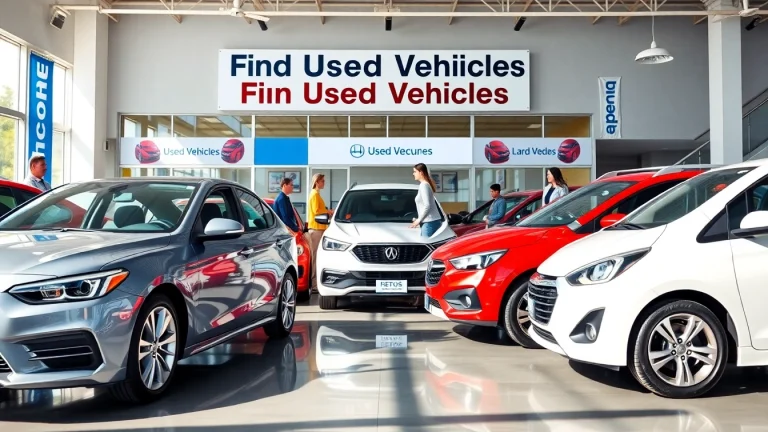
Find Used Vehicles: Your Complete Guide to Affordable Quality Cars
Understanding the Used Vehicle Market
The used vehicle market is more dynamic than ever, providing consumers with various choices, improved pricing, and greater accessibility. As you embark on your journey to find used vehicles, it is important to grasp the current trends that shape this market, the benefits of purchasing pre-owned cars, and the standards for assessing vehicle condition.
Current Trends in Used Vehicles
In today’s automotive landscape, several key trends are influencing the used vehicle market:
- Increased Digital Engagement: The COVID-19 pandemic accelerated the shift toward online shopping, with more consumers utilizing digital platforms to research and purchase vehicles. Websites and mobile apps now play a crucial role in connecting buyers with sellers.
- Rise of CPO Programs: Certified Pre-Owned (CPO) vehicles offer consumers peace of mind, often featuring warranties and rigorous inspections. These programs have become popular, as buyers seek quality assurance when purchasing used vehicles.
- Flexible Financing Options: With interest rates fluctuating, various financing solutions have emerged, making it easier for consumers to afford quality used cars.
- Growing Demand for SUVs and Trucks: There is an increasing preference for larger vehicles, such as SUVs and trucks, based on their versatility and perceived safety.
The Benefits of Buying Used Vehicles
Buying a used vehicle comes with various advantages that can appeal to diverse buyers:
- Cost-Effectiveness: Used vehicles typically cost significantly less than new models, allowing buyers to save money or opt for a higher-quality vehicle within their budget.
- Depreciation Advantage: New cars can lose up to 20% of their value rapidly. By purchasing a used vehicle, buyers avoid the steep depreciation often associated with new cars.
- Variety of Options: The used vehicle market offers a broader range of makes, models, and features, allowing buyers to choose a vehicle fitting their preferences and needs.
- Lower Insurance Premiums: Insuring a used vehicle is often cheaper than insuring a new one, resulting in lower overall ownership costs.
Understanding Vehicle Condition Scales
When evaluating used vehicles, understanding the condition grading scale is vital. Most dealers and online platforms use a classification system from “like new” to “poor”:
- Like New: Minimal wear, no signs of damage or excessive mileage.
- Good: Normal wear and tear, well-maintained, minor cosmetic flaws.
- Fair: Noticeable wear, possible mechanical issues; generally requires some repairs.
- Poor: Significant damage or mechanical issues; often sold as-is, requiring substantial investment for repairs.
How to Find Used Vehicles Online
Top Websites for Used Vehicle Listings
Numerous websites specialize in listing used vehicles. The following platforms are widely regarded as reliable sources:
- Autotrader: One of the largest platforms, offering extensive listings and search features tailored for every buyer’s needs.
- Cars.com: A comprehensive site providing seller and buyer resources, vehicle comparisons, and user reviews.
- Carfax: Not only provides listings but includes free vehicle history reports, allowing for informed buying decisions.
- CarMax: Known for its no-haggle pricing and quality assurance, offering a streamlined buying experience.
- Edmunds: Besides listings, it offers expert advice on what to look for when buying used vehicles.
- TrueCar: Provides market analysis to ensure buyers get fair pricing based on real-time data.
Tips for Efficient Online Searches
To maximize your efficiency while searching for used vehicles online, consider the following strategies:
- Use Advanced Filters: Specify your criteria by using advanced search options, including make, model, year, price range, and mileage.
- Set Alerts: Many platforms allow you to set email alerts for new listings that match your criteria, keeping you informed without constant searching.
- Read Reviews: Prioritize vehicles with positive user reviews and high ratings from reputable sources to ensure quality.
Evaluating Your Options: Reviews and Ratings
Reading reviews is crucial when deciding on a used vehicle. Here’s how to evaluate them:
- User Reviews: Consumer feedback can provide insights into the vehicle’s performance, reliability, and maintenance costs.
- Expert Reviews: Professional automotive reviews analyze technical aspects, safety features, and specifications; these can help validate consumer sentiments.
- Recall Check: Research any recalls associated with a specific make and model to ensure safety and reliability.
Navigating the Buying Process
Essential Questions to Ask When Buying
Asking the right questions is critical to getting the best deal and ensuring you are making a sound investment:
- What is the vehicle’s history? Request a vehicle history report to understand past ownership, accidents, and service records.
- Why is the owner selling the vehicle? This can provide insights into potential issues or the vehicle’s condition.
- Can I have the vehicle inspected? A pre-purchase inspection by a certified mechanic can reveal underlying problems.
- What financing options are available? Understanding your financing options can make you better prepared to negotiate.
Understanding Vehicle History Reports
A vehicle history report is a crucial document that provides insights into a vehicle’s past. Here’s what to look for:
- Accident History: Check for any significant accidents that might affect the vehicle’s condition and resale value.
- Ownership History: Fewer previous owners generally indicate a more reliable purchase, while a vehicle that has changed hands frequently may raise red flags.
- Title Issues: Ensure there are no liens or salvage titles associated with the vehicle, as these can complicate ownership.
Financing Options for Used Vehicles
Understanding your financing options is essential when purchasing a used vehicle:
- Bank Loans: Traditional bank loans may offer competitive interest rates but require good credit and strict terms.
- Credit Unions: Often provide lower rates and more flexible terms compared to traditional banks.
- Dealer Financing: Can be convenient and sometimes includes promotional interest rates, but it’s essential to shop around for the best deal.
Local Dealerships vs. Private Sellers
Comparing Benefits and Drawbacks
Deciding between buying from a dealership or a private seller involves assessing relative advantages:
- Dealerships: Typically offer warranties, certified vehicle inspections, and easier financing support, but may have higher prices.
- Private Sellers: Often provide lower prices and space for negotiation; however, there’s less support, no warranty, and the risk of hidden issues.
Negotiation Tips for Private Sales
Negotiating with private sellers requires strategy and confidence:
- Do Your Research: Knowing the market value helps you negotiate effectively without overpaying.
- Start Low: Begin with a lower offer to create negotiation room, but ensure it’s reasonable.
- Be Respectful: Maintain a cordial tone; being friendly opens doors for better negotiations.
How to Identify Trustworthy Sellers
Trustworthiness is essential when considering private sales. Evaluate potential sellers using these criteria:
- Honesty in Listing: Look for sellers who provide transparent information and respond promptly to inquiries.
- Vehicle Inspection: Willingness to allow an independent mechanic to inspect the car is a good sign of integrity.
- Access to Paperwork: A trustworthy seller should have necessary documentation available, including registration and title.
After the Purchase: Owning a Used Vehicle
Maintenance Tips for Used Cars
Proper maintenance is key to ensuring the longevity and performance of your used vehicle:
- Regular Oil Changes: Following the manufacturer’s guidelines for oil changes can prevent engine problems.
- Fluid Checks: Regularly check coolant, brake fluid, and transmission fluid levels to avoid unexpected issues.
- Tire Care: Maintain proper tire pressure and alignment to ensure safety and efficiency.
Insurance Considerations for Used Vehicles
Choosing the right insurance for your used vehicle is crucial:
- Collision and Comprehensive Coverage: Depending on the vehicle’s age and value, consider these coverages to protect against damage.
- Shop Multiple Quotes: Comparing quotes from different insurers helps find the best deal.
- Adjust Coverage Levels: Ensure your coverage matches your vehicle’s current market value to avoid overpaying.
Maximizing Resale Value of Your Used Vehicle
To retain or maximize the resale value of your used vehicle, consider these strategies:
- Keep Detailed Maintenance Records: Having a documented history of maintenance can significantly increase a vehicle’s resale appeal.
- Repair Minor Issues: Addressing small cosmetic issues can prevent larger, more costly repairs later on.
- Clean and Detail: A well-maintained car interior and exterior can make a strong impression during resale, justifying a higher price.


